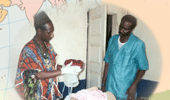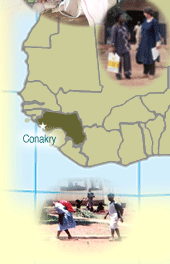
Strengthening Community Response to Obstetric Emergencies
Beginning in 1998, PRIME I and PRIME II received USAID/Africa Bureau funding to partner with Save the Children to reinforce its maternal health program with a community-based model to reduce maternal mortality. The model emphasizes improving responses to obstetric emergencies through stronger links among health facilities, traditional birth attendants (TBAs) and the communities where they work. PRIME implemented the model in the northern district of Mandiana (population approximately 140,000), training TBAs in Community-Based Life-Saving Skills (CBLSS) and helping communities establish emergency obstetric response plans, including revolving transportation funds. In 2001, PRIME II provided assistance to Save the Children and the Adventist Development and Relief Agency to build the capacity of the MOH to expand the model nationally. In partnership with Save the Children, PRIME also strengthened the MOH’s capacity to plan, implement and evaluate TBA training, including developing a training curriculum in emergency obstetric and neonatal care.
Key Results:Under the guidance of eight service providers trained by PRIME, 78 TBAs (39% of those working in Mandiana) participated in facility-based clinical training. An evaluation conducted three months after the intervention showed that TBAs had dramatically increased their knowledge of the danger signs of obstetric emergencies (mean test scores rose from 0% at baseline to 75% post-training, n=78). TBAs also demonstrated significant improvement in their ability to perform infection prevention procedures (scores increased from 33% to 84%), and reported eliminating such harmful traditional practices as giving newborns liquids after birth. A follow-up evaluation 15 months later produced further affirmation of the project’s success, revealing that trained attendants were now assisting in 83% of births—a jump from 36% at baseline. All of the 73 villages participating in the project established emergency treatment and transportation funds.
Improving the Performance of Immunization Workers
Through a regional Performance Improvement initiative in 2002-2003, PRIME II joined forces with BASICS II to strengthen vaccination coverage in Dabola and Kouroussa districts. An internal review of the Expanded Program of Immunizations (EPI) in Guinea had found problems related to vaccine management, injection safety, information management, and accessibility and quality of services. These factors contributed to low immunization coverage and very high drop-out rates: in BASICS target areas in the Kankan and Farakan regions, only 6% and 19% of children were fully immunized. PRIME trained BASICS staff in the PI approach and supported the application of PI to test a model for linking RH service delivery with child survival, with the aim of improving not only immunization coverage but providers’ performance in such areas as infection prevention and safe injection of contraceptives. Outreach strategies were also implemented to sensitize mothers to the importance of immunization. MOH managers at the national, regional and district levels have responded favorably to PI and recommended extending the intervention to other districts.
|











